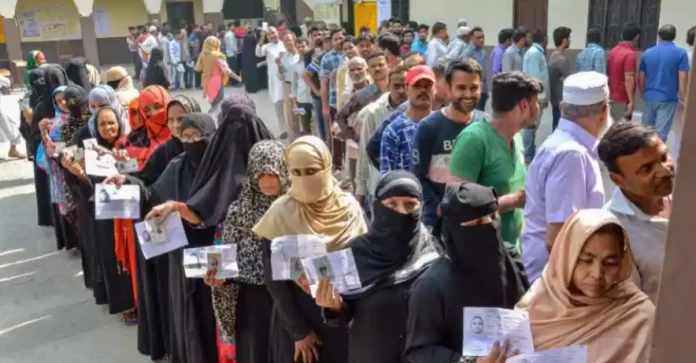22 Apr. 24
As India gears up for the 2024 general elections, analysts are closely examining the voting dynamics of Indian Muslims, drawing insights from recent electoral trends and data.
The strategic voting behavior of Indian Muslims has been a significant aspect of recent national elections. Despite comprising a minority share of the population, their voting patterns have played a crucial role in shaping electoral outcomes. Notably, in past elections, certain parties secured victory with a minority of the overall vote, highlighting the strategic nature of Muslim voter participation.
According to data from the Election Commission of India, the 2019 Lok Sabha elections saw the ruling BJP clinch victory in several constituencies by narrow margins. Notable among these was Machhlishahr in Uttar Pradesh, where a BJP candidate won by just 181 votes. Overall, the BJP secured victory in 77 seats with margins of less than one lakh votes, indicating the significance of every individual vote.
In response to electoral dynamics, there is growing emphasis on strategic voting strategies within the Muslim community. Secular political parties and community leaders are urging Muslim voters to align strategically to counter anti-Muslim sentiments and ensure effective representation.
However, challenges persist with the emergence of smaller parties claiming to represent Muslim interests. These parties, often accused of diluting the electoral impact by attracting a minuscule number of Muslim votes, have complicated the political landscape for Indian Muslims.
Social media platforms, particularly YouTube, have emerged as influential tools in shaping voter perceptions. Reports highlight the proliferation of misinformation and Islamophobic content masquerading as news on certain YouTube channels. These channels, with millions of viewers, wield considerable influence in shaping public opinion, especially during the election season.
Moreover, media bias towards the ruling party is a growing concern. An analysis of news coverage reveals a disproportionate focus on the BJP and Prime Minister Narendra Modi, often at the expense of opposition parties. This bias underscores broader concerns about media influence on voter behavior and the dissemination of factual information.
Journalists covering the elections also face heightened risks, including political violence and censorship, according to a survey by the Committee to Protect Journalists (CPJ). This underscores the challenges inherent in maintaining press freedom and impartial reporting during electoral periods.
In conclusion, the upcoming 2024 elections hold significant implications for Indian Muslims. The need for strategic and united voting efforts is paramount to safeguarding minority rights and upholding India’s constitutional and secular values amidst a complex political landscape.
[Adapted from commentary by Asad Mirza, a senior political and international affairs commentator based in Delhi.]




